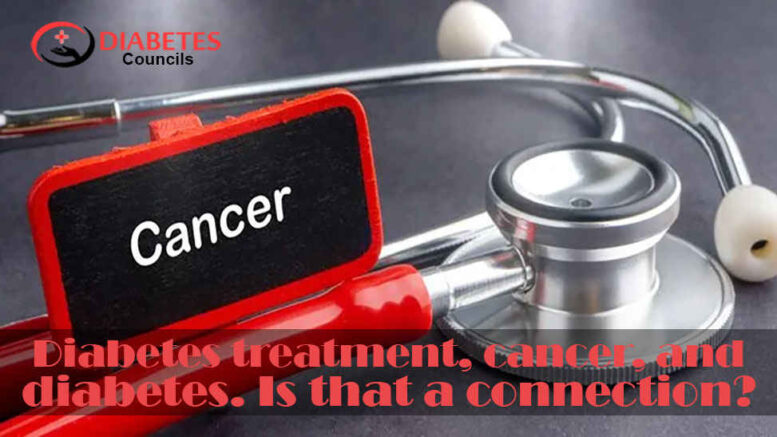In my medical practice, I’ve seen a lot of patients refuse to start using new diabetes drugs because of news reports that associate some diabetes medications with cancer. All medications, including aspirin, have risks and benefits, so diabetics should carefully consider all of their alternatives. Making an informed decision is crucial, but the media may often mislead when it comes to headlines.
Individuals who have type 2 diabetes are more vulnerable to some types of cancer.
Over the last half-century, studies have revealed a rise in a number of malignancies, including those of the liver, pancreas, endometrium (uterine lining), colon, breast, and bladder, among individuals with diabetes, most commonly type 2. Men with diabetes are less likely to develop prostate cancer.
Because the baseline rate of cancer is higher, any study that just “observes” persons with diabetes on new medication would see a rise in malignancies relative to the general population.
Which risk factors are typical for cancer and diabetes?
Certain risk factors, such as aging, obesity, lack of physical exercise, poor diet, alcohol consumption, and smoking, may be shared by the development of diabetes and cancer.
Which risk factors are under the control of diabetics?
Your age is something you cannot change, but there are other risk factors that you can.
A diet heavy in fruits and vegetables and low in red and processed meats is beneficial for both diabetes management and cancer prevention. Obesity is a major risk factor for cancer, particularly breast and colorectal cancer.
Read Also: Which seeds are most beneficial for diabetes?
Reducing alcohol use and quitting smoking lowers the risk of cancer and improves the risk of diabetic complications. Higher levels of physical activity are linked to a lower risk of colon, postmenopausal breast, and endometrial cancer, according to numerous studies. Therefore, changing their lifestyle can help people with diabetes reduce their risk of developing cancer.
Furthermore, individuals with diabetes should have the right kind of cancer screening based on their age and risk factors, just like everyone else.
Exist any diabetic drugs that have been linked to cancer in people?
As of yet, no randomized study has demonstrated a clear connection between a particular medication used to treat diabetes and cancer.
Metformin: As of right now, no randomized studies have demonstrated a connection between a particular medication used to treat diabetes and cancer. The good news is that metformin appears to be associated with a decreased risk of cancer based on observational research.
A recent randomised experiment examined the use of metformin in breast cancer patients. Overall survival did not improve, however there was an advantage for a subgroup.
The results of recent trials evaluating metformin as a cancer treatment have not been encouraging. These trials were carried out in a hurry, with little thought given to which patients would benefit most, how metformin combats cancer, or the most effective way to mix it with other therapies.
There is yet hope, though. Research on the use of metformin in particular patient populations has to be properly planned and designed, particularly when used in conjunction with immunotherapy or as a cancer prevention intervention.
Insulins: Before being released into the body, insulins are investigated to make sure they do not stimulate aberrant cell growth. People with diabetes who are also at a higher risk of developing certain types of cancer may experience an increased incidence of cancer if they use insulin, according to certain observational (rather than randomized) research.
This might not be an insulin-related cause and effect, though. There seems to be a correlation between cancer and greater endogenous (made in the body) insulin levels in individuals with severe insulin resistance however, no randomized trials have found a correlation between exogenous insulin (injected into the body) and cancer. Higher insulin levels have not been connected to cancer in a type 1 diabetes investigation.
DDP-4 Inhibitors: It has been demonstrated that DDP-4 inhibitors, such as sitagliptin (Januvia®), linagliptin (Trajenta®), and saxagliptin (Onglyza®), have no effect on the risk of cancer, with the exception of colorectal cancer, for which the medication is linked to a markedly lower risk.
SGLT-2 Inhibitors: Despite early worries, new research indicates that people on SGLT-2 inhibitors, such Jardiance®, may not have a higher risk of developing bladder or breast cancer. Preliminary research has even suggested that individuals on an SGLT-2 inhibitor who had pre-existing diabetes and non-small cell lung cancer have a higher chance of survival; however, these results need more research.
GLP-1 Agonists: The more recent family of medications known as GLP-1 agonists has raised some concerns due to possible links to pancreatitis and pancreatic cancer in cases of recurrent pancreatitis. According to recent studies, GLP-1 users did not have an increased risk of pancreatic, thyroid, or general cancer.
In summary, the bottom conclusion is that, at this time, choosing a type 2 diabetes medication should not be based on concerns about cancer risk.


Be the first to comment on "Diabetes treatment, cancer, and diabetes. Is that a connection?"